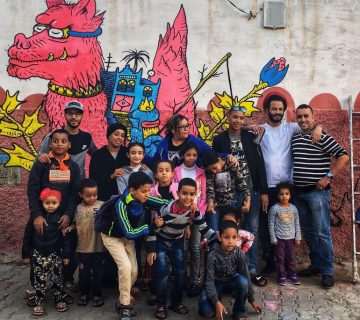
I cannot allow myself to start explaining or describing the program before I, in the name of everyone at L’blend, pay tribute to the fuel behind this program. The one who has made it her mission to take our work to the next level by making sure we properly apply to the AFAC (Arab Fund for Arts and Culture) fund: Paula, we can never thank you enough. You will always be part of our team and we are very much looking forward to having you among us very soon.
The name, as you would expect, was a brilliant word play by Paula herself. Rooted In The Future, in reference to identity being a continuous timeline lasting from, not only our lived past, but our history as groups and races. This program started from an observation we made in our region where different groups identify with a language. Some consider themselves Arabs because they speak a dialect of Arabic. Some identify as Amazigh because they speak a dialect of Amazigh. We, however, see both as right. We are both Arab and Amazigh, and more, and we refuse to deny or give up any of our identity’s layers.
We stand at a place in which we would like to see ourselves as the result of endless migration waves over the history of our land. We stand at a place in which we believe these meetings of different races must have created, more than just wars and confrontations, but sparks of love and cross-pollination of cultures. We are the result of progress. We are rocks that have been polished by different waters to become who we are. And progress shall continue and may the polishing continue.
Amine Maalouf in his book “In The Name of Identity” perfectly explains the situation introduced above. He claims that we, as individuals and small groups, identify with the oppressed layer of our identity. In our region people identify as Amazigh because, they are often put in a position of minority when it is historically believed that the Amazigh people are the indigenous people of North Africa. This situation creates a conflict resulting in denying the Arab component to support a cause. It is rather a political statement than a deep inherited belief. We can notice the same defensive behavior from the same people denying their Arab component once it is under attack by racist occidentals or islamophobes. The moment we are subject to an orientalist judgement we are, again, ready to identify with the one layer oppressed.
The analysis can go deeper and deeper then we will end up drifting away from the purpose of this article, which is, to introduce the program. As long as this introduction was, we believe a proper introduction of the context in which the program was designed gives the necessary depth we hope to reach through this program.
This program aims to use visual and performance arts to analyze and start a constructive debate over the complexity of identity in order to show the multitude of layers making it and the possibility of building your own without denying any of its aspects.
For this program, we chose the following art forms:
· Graffiti :
We will host both a graffiti workshop for 20 applied arts students and a mural painting, both will be led by the one and only: Normal.
“This work is the expression of an introspective journey towards knowing oneself. It is about perceiving identity beyond persona, lighting up the unexplored and accepting the rejected.” Says Ayoub Abid AKA Normal about his mural painting.
The choice of graffiti in both activities is due to the strength of the art form, as it is not an elite or museum art form. It is exposed to the grand public at all times and lives in time. It evolves in meaning as they evolve in perspective. From our standing point, it is a great tool to make a lasting and visually appealing statement. For the workshop, we hope our participants will explore new processes of work and learn from the artist. In addition to that, there is a big market for mural painting in the world now and the market is growing. We would love to see local artists enter the field and the market.
· Theater :
44 workshops will take place for 30 selected young girls and men. The goal is to work towards producing 3 plays about the theme of the program to be played in at least 3 places. The workshops will tackle technical aspects and theoretical aspects. We want our participants to understand the rules they have to apply in order for them to be able to bend them as they need to and set their creative minds free. The sessions will be a yearlong debate to, eventually, create 3 plays with strong and clear statements.
· Cinema :
11 movie screenings and debates around movies all related in a way or another to the theme of the program. The movies should evoke conversation and debate, and will be in an environment of freedom of expression as it has always been the case at L’blend.
· Music :
3 weeklong residencies bringing national and international artists together with local artists to explore their musical identities to produce expressive works. These residencies will not only be a chance for the artists to wear the cap of researchers for a week. These residencies will also be a chance for our artists to learn from each other and feed from the city’s energy.
By the end of this program, we hope we would have visualized, performed, and made audible versions of a perspective of identity.


